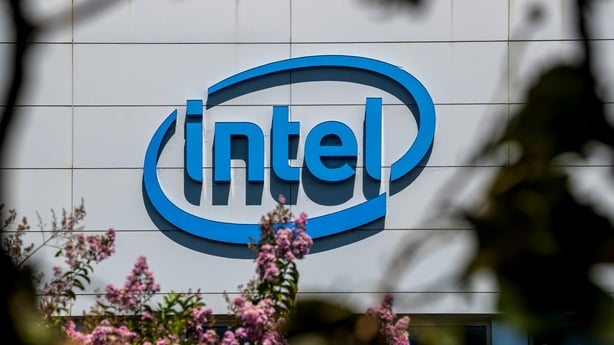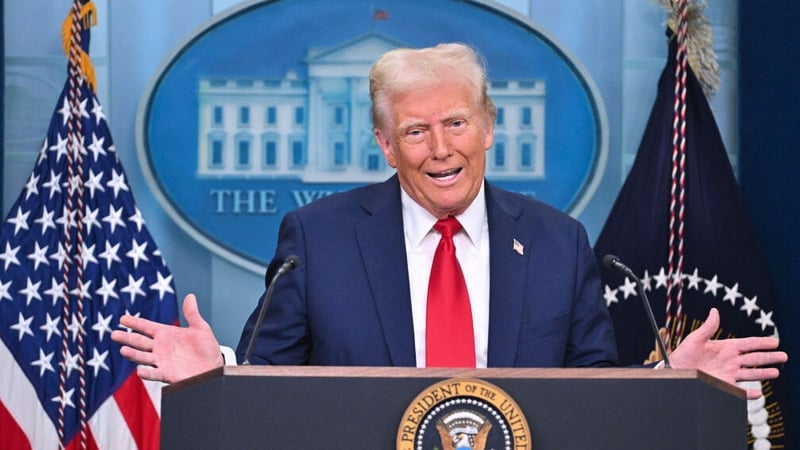As the blizzard of announcements coming from the White House during Donald Trump’s first weeks in office continues, Irish authorities are braced for being caught in a trade war.
While the US president’s tariffs on Canada and Mexico have been paused, he has proceeded to apply duties on all Chinese goods.
Since taking up office Donald Trump has repeated his commitment to taxing goods entering the US from the EU, which could have far-reaching ramifications for American companies here which employ 210,000.
Ireland is more exposed than other EU countries to tariffs because it exports proportionately more to the US than other member states.
The US is the country to which Ireland sells most goods, with a value of €54bn.
Of that, €36bn is pharmaceuticals and medicines, much of which is made by American companies here, such as the giant corporation Pfizer.
Ireland exports more to the US than it imports and is running a trade surplus in goods of €31bn.
Donald Trump is fixated on surpluses and perceives them as evidence of other countries taking advantage of America.
He also takes issue with large US multinationals manufacturing abroad to sell products to consumers in the States, which is exactly what happens in Ireland.
Authorities here are concerned about the potential for tariffs being extended to Ireland’s huge exports in pharmaceuticals to the US.
However, in 1994 drugs were excluded from any duties under a World Trade Organisation agreement.
Some people in government circles believe this might make it less likely that the White House would include pharmaceuticals.
It also means there is no mechanism for duties to be applied to drugs.
But it is clear that Donald Trump has no hesitation about abruptly pulling out of major international pacts, such as the Paris Agreement on climate or the OECD deal to stamp out the use of tax avoidance.

US multinationals in Ireland
When looking at Ireland’s trade with the US it is important to take services into account.Irish imports of services are a gargantuan €186bn.
Much of this is US multinationals with operations in Ireland paying their parent companies for use of know-how, known as intellectual property.
For example, if a drug company is manufacturing a medicine, it pays its headquarters a royalty fee for the right to use the formula to make the product.Irish imports of services are much higher than exports of services to the US resulting in an enormous deficit of €133bn.
These payments are not subject to tariffs, but Donald Trump could target them with a tax change.
If this was to happen it would be both complicated and potentially fraught for Ireland.
But the new president’s policies are designed to encourage corporations to move large manufacturing operations back to the US.
That is much easier said than done. Take the example of Intel which has made an investment of €17bn in its vast computer chip manufacturing plant in Leixlip, Co Kildare.
Can Donald Trump’s policies make it financially attractive to uproot an operation like that to the US?
Multinationals in Ireland are part of a highly sophisticated web of manufacturers, suppliers and distributors.
Pulling one important piece out of the supply chain would be challenging. Many US pharmaceutical companies with operations here also use Ireland as a gateway to the EU.
That requires licences to sell to European consumers which are much easier to obtain if the plant is in a member state. So while shutting a large operation is unlikely, manufacturers could reduce output here by increasing it in other plants.
The White House’s policies could also make it much more difficult for Ireland to win new job projects.
Irish Govt treading carefully
The Irish Government’s policy response to Donald Trump’s threatened tariffs is to tread carefully until his plans become clear.
Tánaiste Simon Harris has taken responsibility for trade as part of his portfolio. However, agreements on tariffs are negotiated by the EU on behalf of member states and the key decision regarding trade deals will be made in Brussels.
And here is where it could become particularly difficult.
If the US does impose tariffs on EU goods it is clear Brussels will retaliate.
Due to Ireland’s strong trade connections with America, it could be disproportionately affected.
Tariffs introduced by Donald Trump in his first term were on specific goods such as steel and aluminum, which are not significant Irish exports, but producers here were hit by duties on butter, cheese and cream liqueurs.
European politicians remain in the dark about what will happen
Ultimately, those taxes were suspended. But there are some significant questions about his plans.
It is not clear if Donald Trump will simply impose tariffs on all goods from the EU as he has done with China, or on specific products.
How would the EU retaliate? In the past, in imposing tariffs on goods from the US, it has targeted Republican states. Duties were levied on bourbon and Harley-Davidson motorbikes, for example.
The EU could also try to cut a deal with the White House and pledge to buy more liquid petroleum gas in exchange for dropping tariffs.
But European politicians remain in the dark about what will happen.
As with everything involving Donald Trump, the only thing that is predictable is his unpredictability.




